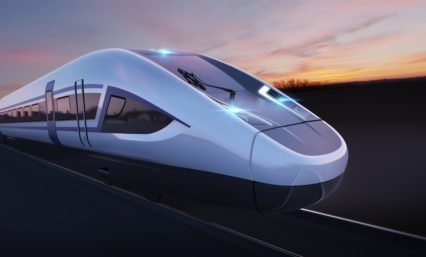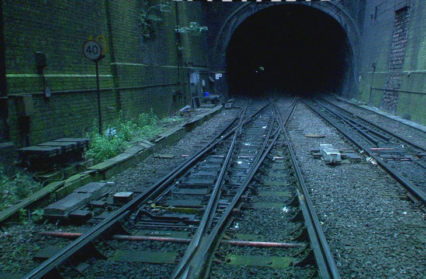Caragh Medlicott explores the raw deal Wales has been promised from the UK Government as HS2 gets the green light from Westminster.

Last week I found myself re-watching a BBC Breakfast interview on my commute to work. I wanted to check I’d remembered a statement from the transport secretary correctly. My pacer train heaved its way out of the station with a wincing screech as Grant Shapps confirmed my recall. “HS2 is the biggest infrastructure development in Europe.” Ah, so that was it. A bold statement, and one which plays directly into the narrative of the UK’s pseudo-superiority amidst our exit from the EU (and a boast which only withstands scrutiny if the high-speed railways already in place across Europe are expressly ignored). The reality of HS2 is messy and complex, yet the message from the UK government is crystal; Westminster are baking a big, overpriced pie and Wales will be left, once again, with rumbling stomachs.
The HS2 tennis ball has been batted about both the headlines and parliament since the announcement of its go-ahead back in 2012. The route is set to connect London, Birmingham, Manchester and Leeds with a high-speed railway which will enable trains to reach speeds of up to 250mph. As the project bloats with overspend and stretches in duration, it seems the ultimate cost could drain the UK economy to the tune of £106bn, with the final completion date currently projected to be 2040.
The outward ambition of HS2 is a simple one; to slash travel times and improve connections between major cities. An aim which ultimately boils down to quicker and more efficient routes to London. News vox pops display disgruntled northern commuters frustrated and put out by their failing inner-city train services while ancient woodland and family homes await flattening in wake of HS2’s uncompromising route. The debate about whether HS2 is really good for the north of England rages on, yet Wales is emitted from the discussion entirely. Why? Because there is no debate. Not only does HS2 offer no advantages for Wales, but according to figures released by the Department for Transport (FFT), it may actually forfeit the south Wales economy £200m per year when it is finally completed.
Wales’ trains are infamously underfunded, unreliable and responsible for afflicting misery on commuters across the nation every day. Just last month we saw Transport for Wales (TfW) fine KeolisAmey £2.3m for their poor performance since taking over from Arriva in 2018. Previous plans to improve train services in Wales have regularly been overlooked or dropped entirely. Such a case appeared in 2017 when Theresa May announced her government would be scrapping a plan to electrify the lines between Cardiff and Swansea. Disappointment and inadequacy are words all too familiar to the discussion of transport in Wales.
Amongst the statistics and debates are the emotions of real people. For daily commuters, regular disruption means hours added onto the working week; time which is often spent weather-beaten in train stations that are poorly equipped to shelter crowds of people. The frustration goes beyond lost time, too, with many receiving trouble in work for continual lateness.
While the Welsh government has powers to decide who provides trains and runs services on Welsh rail lines, decisions over where tracks are laid and when they are upgraded remain reserved to ministers in London. This means Wales won’t necessarily receive “consequential” money for rail infrastructure projects in England. The Welsh economy minister Ken Skates urged the UK government to guarantee extra money, while first minister Mark Drakeford has called on the prime minister to extend the HS2 project into Wales. Considering the weary line from the UK government – a weak rehashing of minor achievements and more unconvincing claims that HS2 benefits Wales – it seems the demands of Welsh politicians are unlikely to be met.
Changes in infrastructure and investment seldom happen fast. Behind the slow churn of bureaucracy are the daily frustrations of passengers; the kind which corrodes good spirits and stokes personal resentment. In December, TfW announced it would be increasing capacity on its infamously crowded valley line services. While ostensibly positive, this change is yet to relieve cramped carriages at peak times. Regular congestion coming into Cardiff Central and platform overflow continue to rankle on any given weekday. The pacer trains in frequent use across Wales have been allowed to stay on tracks despite not meeting new accessibility laws. Why? Because the burden of passengers could not be shouldered without them. Considering the cash and development efforts flowing into the continuation of HS2, rail infrastructure in Wales looks all the more emaciated by comparison.
Environmental policy and subsequent goals to eliminate carbon emissions are moving to the forefront of global politics. In such a period, public transport becomes increasingly paramount. Extreme weather is adding strain to the current disarray of public transport reform. This fact has only been spotlighted further by the disastrous consequences of recent storms and flooding. It is clear that we are ill-prepared for escalating weather conditions – exacerbating a vicious cycle when it comes to greener transportation.
The UK government has announced incremental improvements to public transport as a whole, with Boris Johnson pledging £5bn to improve bus services across England and Wales. While not totally insignificant, it seems a meagre amount when set next to the towering cost of HS2; not to mention that such an investment does little to amend the damage inflicted by historic cuts from the Conservative government, or the continued oversight which has been felt throughout Wales. As many have pointed out, the money hoovered up by HS2 could have a real – and importantly – timely impact used in other areas.
Dwelling on the HS2 go-ahead may do little to soothe its consequences, yet the very real anger and frustrations of Wales are worth heeding. With rural areas isolated by poor or non-existent connections, plus daily battles for commuters, it’s clear that the biggest infrastructure development in the UK and Europe offers nothing but discontent for passengers in Wales. The first minister has described a nation as “systematically neglected” while experts call for rail powers to be devolved. With not a stitch of HS2’s expensive track to cross the border, there’s plenty of cause for disappointment, but little for a surprise.
Caragh Medlicott is a regular contributor to Wales Arts Review and an Associate Editor.




 Enjoyed this article? Support our writers directly by buying them a coffee and clicking this link.
Enjoyed this article? Support our writers directly by buying them a coffee and clicking this link.







